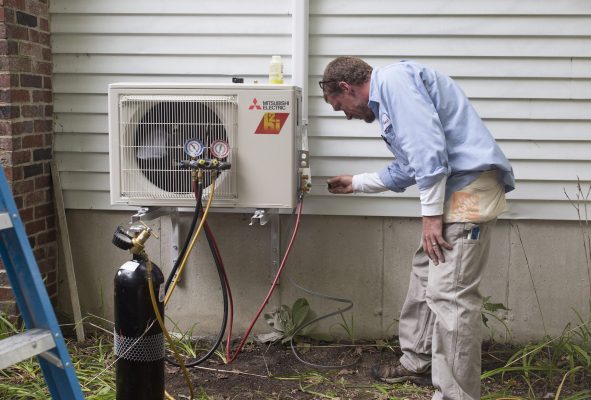Let’s face it: Most people aren’t early adopters, especially when it comes to their homes. Take the kitchen, for example, where many people still buy gas cooktops despite induction’s superiority. It’s not because everyone’s busy charring peppers over an open flame — it’s because they’re slow to adopt changes.
When it comes to heating and cooling, that’s a problem for the climate. Together, they account for about half of all energy use in U.S. homes. Heating is a particular challenge since only 40% of homes use electricity; the rest burn natural gas, propane or some other fossil fuel. When the old furnace is dying, its replacement is usually more of the same. To reduce reliance on fossil fuels, switching to electric heat pumps is going to be key.
“If your trusted contractor — who you call to come into your home to help figure out what to do with your system — doesn’t offer a heat pump, you’re just not going to buy one, right?” said Anuj Khanna, founder and CEO of Service 1st Financial.
That gap between what contractors offer and what’s needed to electrify households is part of the reason Khanna founded Service 1st Financial, which offers what he calls “home comfort as a service.” The company is announcing a $5.85 million Series B today that includes a $15 million subordinated debt facility, TechCrunch has exclusively learned. Khanna said he expects the Series B to close “before year end.” The equity investment was co-led by S2G Ventures, which also led the subordinated debt facility. Other investors were not disclosed.
The company offers leases that allow homeowners to pay for their HVAC systems over time while coupling them with maintenance plans for the life of the contract, which typically lasts 10 years, at which point the homeowners can opt for a new system.
“The home comfort industry is this old-school, slow-to-change industry that’s still just selling product,” Khanna said. He said that’s at odds with broader market trends that suggest people are now comfortable buying services instead of products.
HVAC contractors do offer annual service plans, but typically just cover basic maintenance, which Khanna said is the market’s attempt to boost customer retention.
“They hope that you stay on that plan long enough that they eventually get the next replacement sale,” he said. “The problem is it doesn’t actually serve the intended purpose. And it’s not a great customer experience because every time a contractor is generally in that home, they’re then trying to sell something else to the customer. And that’s not what customers want — they want their system maintained so it never breaks.”
Khanna was inspired to found Service 1st Financial after leaving his last job at a private equity firm. There, he led an investment into a large home services company owned at the time by Lennox, the HVAC systems manufacturer. He said during his time on that investment, there was “no discussion whatsoever at the contractor and consumer level going on about sustainability.”
Once the company was turned around, the PE firm sold it to Enercare, a Canadian company. In Canada, a leasing model is more common, Khanna said, and Enercare used the purchase to bring that business model to the U.S.
“I was kind of sitting on the sidelines doing some other things in my career, and I said, ‘You know, there’s a massive opportunity here.’ Consumer purchasing behavior is changing,” Khanna said. He founded Service 1st Financial in 2019 with his own money and an investment from Thayer Street Partners.
Today, the company has customers in 25 states. Khanna said that his company’s portfolio is about 32% heat pumps, which is about double the national average of about 15% of all homes, according to the U.S. Energy Information Administration.
The Inflation Reduction Act, which offers tax credits for heat pumps, is expected to supercharge the market. Khanna said lease originations are already up 80% year over year, and growth could hit 400% next year. In addition to expanding geographically, he said the funding round would also go toward building a learning management system to help train HVAC contractors. More partnerships could be on the table, too. This summer, the company announced a partnership with HVAC manufacturer Fujitsu, and it has another in the wings.
Service 1st holds its lease contracts in a special purpose vehicle, Khanna said, which is also the recipient of the subordinated debt facility. The SPV also has a debt facility with Forbright Bank, a lender that focuses on decarbonization. The subordinated debt facility allows the startup to “use our equity for extremely high ROI initiatives at the parent to continue to grow and scale the business,” Khanna said. He added that S2G was interested in the subordinated debt facility because of Service 1st Financial’s lessees’ “extremely low default rates and very strong credit quality.”
Khanna said that his company has been approached by utilities interested in having Service 1st Financial run their energy-efficiency programs, moving them away from selling discounted items and toward a service-based model.
“Their focus is on electrified heat pumps. Can we incentivize the purchase of electrified heat pumps through a service-based model that can allow homeowners to replace those systems every 10 years or so?” he said.
It’s a very different model than U.S. utilities are used to, but they’re finally interested in testing something new.
“I think this is where the Inflation Reduction Act is causing some organizations that typically take a long time to make decisions to move very quickly,” Khanna said.
